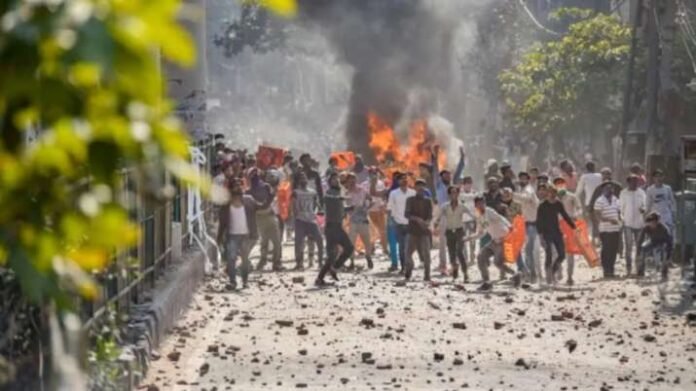A Delhi court sentenced Lokesh Kumar Solanki to 3 years in jail for inciting hatred during the 2020 Delhi riots. | The Legal Observer
Subheading:
ASJ Praveen Singh observed that the convict fuelled communal tensions by targeting the Muslim community during the 2020 Northeast Delhi riots.
In a significant development in the long-running legal proceedings stemming from the 2020 Northeast Delhi riots, a Delhi court has sentenced Lokesh Kumar Solanki to three years of imprisonment. Solanki was found guilty of inciting communal hatred and contributing to the violence that erupted in the national capital in February 2020.
Delivering the judgment at Karkardooma Courts, Additional Sessions Judge (ASJ) Praveen Singh noted that Solanki’s actions were “not only unlawful but dangerously provocative,” and “promoted hatred against Muslims and added fuel to the already simmering communal tensions.” The court had earlier convicted him on June 5, 2025, under multiple sections of the Indian Penal Code (IPC) related to hate speech and rioting.
🔍 The Charges
Solanki was booked under Sections 153A (promoting enmity between different groups on grounds of religion), 147 (rioting), and 149 (unlawful assembly) of the IPC. The court observed that the accused was part of a mob that not only incited violence but also played an active role in stoking communal animosity.
According to the prosecution, Solanki was captured in CCTV footage and mobile videos shouting incendiary slogans, some of which were communal in nature, while allegedly urging others to target members of the Muslim community. The videos formed a crucial part of the prosecution’s case, corroborated by witness testimonies and electronic evidence.
⚖️ The Court’s Observations
In his detailed sentencing order, ASJ Praveen Singh emphasized the gravity of the offence in light of the fragile communal harmony in the region at the time. The court remarked:
“The convict’s conduct was not merely participation in a riot. He used his presence and voice to inflame sentiments, further polarizing the community. The hate speech, targeting a specific religious group, goes beyond the bounds of free expression and enters the domain of criminal provocation.”
The court underscored that individual accountability in large-scale communal violence is essential to prevent future escalations and maintain the rule of law.
🎙️ Defence & Prosecution Arguments
While the defence argued for leniency on the grounds that Solanki had no prior criminal record and was merely “swept up” in the chaos, the prosecution countered that his role in aggravating tensions was deliberate and dangerous.
Public Prosecutor N.K. Jain argued:
“He was not a passive bystander. His speech and gestures were inflammatory, calculated, and executed with full knowledge of the consequences. This cannot be brushed aside as impulsive behaviour.”
The defence counsel urged the court to consider Solanki’s young age and family responsibilities, requesting either probation or a minimum sentence. However, the court held that public interest and the deterrent value of punishment outweighed the plea for leniency.
🧨 Background: The 2020 Delhi Riots
The 2020 Northeast Delhi riots were among the worst communal disturbances in the capital in decades. Sparked by clashes between supporters and opponents of the controversial Citizenship Amendment Act (CAA), the violence claimed over 53 lives—a majority of them from the Muslim community—and displaced hundreds.
Multiple cases have been filed and investigated by the Delhi Police, several of which are still pending before the courts. Civil rights groups and fact-finding commissions have criticized the selective and delayed nature of investigations, raising concerns about procedural fairness and transparency.
🧑⚖️ Legal and Social Implications
Solanki’s conviction is being viewed as a test case for the judicial system’s ability to deliver justice in communal violence cases. Legal experts say the sentence reinforces the principle of individual accountability, even when the crime occurs in the context of mass unrest.
Advocate Shahrukh Alam, a constitutional law practitioner, told The Legal Observer:
“This judgment sends a strong message—freedom of speech does not extend to hate speech. Courts must walk a tightrope between safeguarding constitutional rights and preventing misuse of liberties for inciting violence.”
The case has reignited public debate around hate speech laws, enforcement standards, and the role of law enforcement agencies in curbing communal tensions before they spiral into violence.
📺 Related Coverage and Further Reading
- For more on ongoing court proceedings related to the 2020 riots, visit our News Section.
- Watch exclusive legal commentary on the case on our YouTube Channel.
- Explore deeper debates on hate speech and communal accountability in our Insight Series.
Disclaimer: This article is based on available court records and media sources. For legal queries, visit our Legal Helpline or Contact Us.




